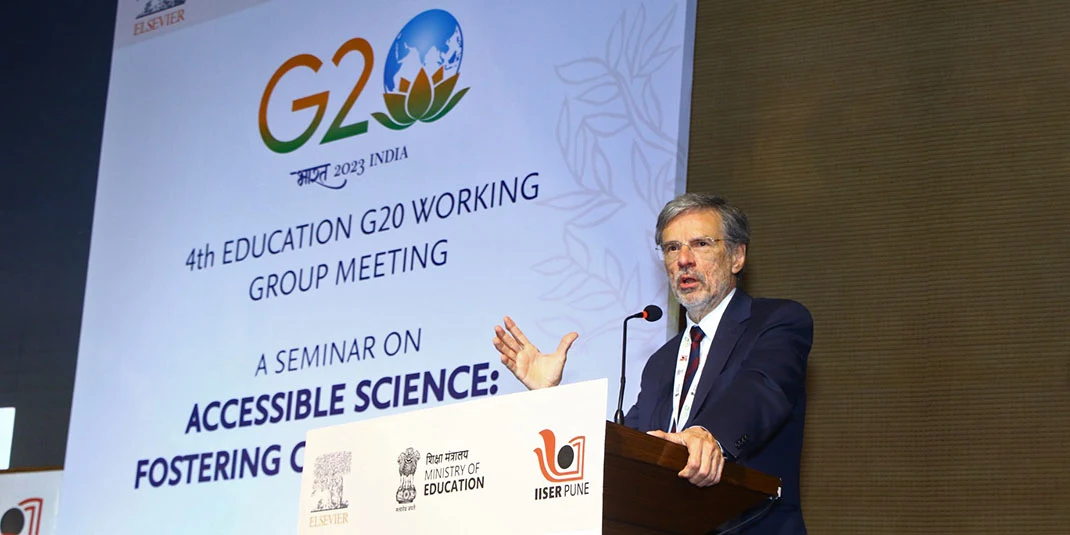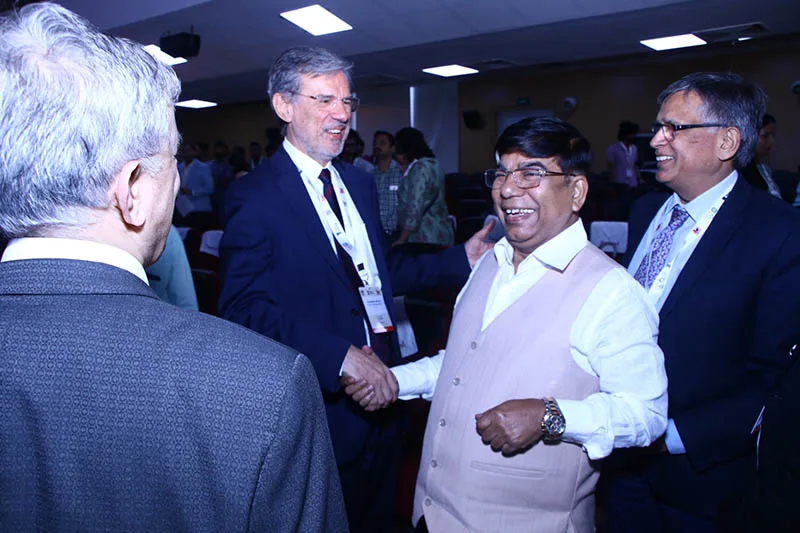Global South nations are making gains on the research playing field
12 juillet 2023
Par Carlos Henrique de Brito Cruz, DSc, OBE

Elsevier’s new report reveals which G20 countries are gaining ground in research — and what that means for the state of the world
India has overtaken the UK to become the third largest producer of scientific publications among the Group of 20 (G20) nations in 2022.
This was among the findings of a special report I authored, Fostering collaboration: a study of scientific publications with authors in G20 countries S’ouvre dans une nouvelle fenêtre, which was released today. Highlights were shared by India’s Ministry of Education in June at a precursor event for the international research and scientific community in Pune ahead of the 4th G20 Education Working Group Meeting. India holds the presidency of the G20 through November.
Report highlights
Last year, more than 280,000 research articles were published by local authors based in India and nearly 240,000 by UK-based Indian authors, the report revealed.
The report also shows that over a 10-year period between 2012 and 2022, the average annual growth rate for the number of scientific publications among authors in India was 9.7% compared to 1.9% for the UK. Meanwhile, China’s growth rate was 9.3% while that of the US was 0.5%.
While the change is not unexpected given India’s 1.4 billion population in 2022 (which is more than 20 times that of the UK’s 67 million), it carries significant meaning and suggests a profound impact. The capacity to contribute new knowledge to the global science enterprise is becoming more evenly distributed, and we’re moving in the right direction. But there’s still some way to go in terms of attaining a more level “playing field.”
Other Global South countries are also enjoying high growth rates for their scientific output. From 2012 to 2022, the number of publications by authors in Indonesia grew at an annual average rate of 26%, Saudi Arabia’s grew by 17% and South Africa’s annual growth rate was 7.8% — all well above the world average annual growth rate of 3.6% and even the G20 countries’ average of 4.1%.
Why “a flatter world” is good for science — and all of us

India's Hon'ble Minister of State for Education, Dr Subhas Sarkar, making his acquaintance with Dr Carlos Henrique de Brito Cruz, OBE.
Borrowing from the title of Thomas Friedman’s 2005 book S’ouvre dans une nouvelle fenêtre, a “flatter world” for science is a good thing for many reasons. As more researchers contribute to the advancement of science, our capability to tackle the “wicked problems” that affect humankind — pandemics, climate change, food scarcity — increases. In addition, a more geographically and culturally diverse research workforce means that the ideas, culture, needs and challenges faced by a larger and much more diverse community will be given greater consideration when assessing issues and their proposed solutions.
The rise of the Global South sends a strong signal to historically more research-intensive nations that the status quo of conducting science where only a few nations could collaborate exclusively among themselves must make way for more open and collaborative approaches.
The challenges of collaborating in a diverse world
Research collaboration in a diverse world can be more beneficial, though it can also be a much more challenging proposition. How data is shared; how intellectual property is held, exchanged or licensed; how students are trained; how best practices in research are defined; and how to strike a balance between national and international interests require a global rethink.
The “flatter world of science” might also be, in part, a result of the advances brought about by globalization. Paradoxically, the results of years of openness and collaboration are now at an inflection point: in a world that is gradually facing a de-globalization, many governments are wary of the openness under which research collaboration, especially among university researchers, usually work.
When one looks at specific topics, the imperious need for greater collaboration is evident. Take, for example, the scientific output related to Sustainable Development Goal (SDG) 2 S’ouvre dans une nouvelle fenêtre, aimed at eliminating world hunger. Elsevier’s SciVal data shows that in 2013, among the 20 countries with the largest scientific SDG2 output, seven belong to the Global South: China, India, Brazil, South Africa, Mexico, Iran and Pakistan. In 2022, these were numbered 10 with the inclusion of Indonesia, Ethiopia and Russia. SDG 15 S’ouvre dans une nouvelle fenêtre, which examines impact on biodiversity and conservation follows a similar trend: China was the only Global South country amongst the five main contributors in 2013 and was joined by India and Brazil in 2022.
Topics on advanced technology such as artificial intelligence yielded a similar trend. Four countries – China (the largest contributor), India, Brazil and Iran – from the Global South were among the 20 main contributors in 2013 to be joined by Indonesia, Malaysia, Russia, Turkey, Saudi Arabia and Bangladesh in 2022. Brazil dropped out of the 20 largest contributors.
Still, many challenges remain. Data shows that for countries in the Global South, advances in scientific publications do not translate quickly into technological capability. Science appears to internationalize and spread more quickly than technology capacity does, which is consistent with Louis Pasteur’s saying: “Science knows no country, because knowledge belongs to humanity, and is the torch which illuminates the world.”
The analysis of scientific publications highlights to us the contrasting challenges of developing science in the academic sector and technology in the corporate sector. Looking at G20 countries, 2.8% of Global North publications are authored by research from corporate entities compared to just 0.8% from countries in the Global South.
The key challenge for countries in the Global South remains the extraction of economic impact from the knowledge created in the academic sector because collaboration between the academic and corporate sectors demands the existence of researchers working across both sectors.
Prof Carlos Henrique de Brito Cruz, DSc, OBE
Prof Carlos Henrique de Brito Cruz S’ouvre dans une nouvelle fenêtre is Senior VP of Research Networks at Elsevier, based in Oxford. He has a highly distinguished career in research as a scientist, a university leader, and a research funding agency leader. As a researcher he has degrees in both Electrical Engineering and Physics and worked at the University of Campinas, University of Rome, University Pierre et Marie Curie and AT&T Bell Laboratories. As a university leader, was Rector of the University of Campinas, which is consistently ranked among the top universities of Latin America. As a funder, Brito was, for 15 years, the Scientific Director at the São Paulo Research Foundation (FAPESP), where he worked to develop a broad network for international research collaboration with entities around the world. He also chaired the Governing Board of the Global Research Council, which comprises the heads of science and engineering funding agencies worldwide, promoting the sharing of data and best practices for high-quality collaboration among funding agencies.
A member of the Brazilian Academy of Sciences and a Fellow of the American Association for the Advancement of Science (AAAS) and of the American Physical Society (APS), Brito is a member of the Shell Science Council, the International Advisory Board of the Alexander von Humboldt Foundation, and the Panel of Judges for the Queen Elizabeth Engineering Prize. He received the Ordre des Palmes Academiques de France, the Order of the Scientific Merit from the Federative Republic of Brazil, and the Order of the British Empire (OBE).
Contributeur

CHDBCDO
Carlos Henrique de Brito Cruz, DSc, OBE
Senior Vice President of Research Networks
Elsevier